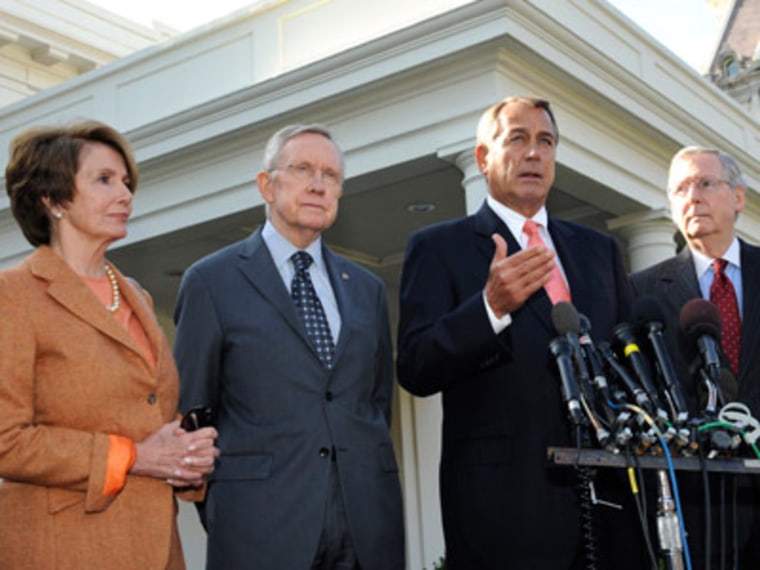It was just two weeks ago when Rep. Adam Smith (D-Wash.), the senior Democrat on the Armed Services Committee, argued that it would be "wise for Congress to come together and draft a grant of some authority" for President Obama to use force against ISIS targets. He just didn't think it's possible – not "in a million years."
"There is simply no way on earth that members of Congress are going to come together and agree on what the language for an authorization for the use of force in Syria is -- it's just not going to happen," Smith told the New York Times.
At the time, that seemed like a safe bet, and I shared Smith's assumptions. But just over the last couple of days, the prevailing winds seem to have shifted. While the week started with congressional leaders taking a pass on the issue, a new consensus started to come together: Congress can't just do nothing.
Jake Sherman has the latest from the Hill:
[I]nternally, senior aides to Speaker John Boehner, Majority Leader Kevin McCarthy and Majority Whip Steve Scalise recognize that there's a significant enough outcry from lawmakers to have an up-or-down vote on Obama's plan. The issue came up at a closed House briefing Thursday, and White House officials reiterated that it's their strong preference to have the language included in the government-funding bill, in order to orchestrate a quick passage. The Republican leadership is considering a few options.
There's a pending measure to fund the government through mid-December -- the "continuing resolution," or "CR" -- that Congress must pass to avoid a shutdown. As far as the White House is concerned, that creates an opportunity: add the anti-ISIS provisions to the spending measure and lawmakers can tackle two important tasks at once.
But for many lawmakers, in both parties, it's not that simple. Some want to keep the government's lights on, but have real concerns about the counter-terrorism strategy. Others aren't comfortable with combining these two important-but-unrelated measures on principle. Others want to take more time, beyond the end of the fiscal year that ends in 19 days.
For those of us who believe Congress has a constitutional obligation to weigh in, the fact that lawmakers are debating how, and not whether, to move forward is itself a sign of unexpected progress. But that doesn't mean the road ahead will be easy.
Rep. Steny Hoyer (D-Md.), a member of the House Democratic leadership, said he expects a two-step process in which Congress takes up a bill in the short term to support training anti-ISIS rebels, and then after the election, lawmakers would take up "consideration of a larger authorization for the use of military force."
But this is only one option. Members could also take up one bill related to the ISIS mission, which includes both rebel support and presidential authorization. If the two are split, both could receive votes before Congress leaves town, or maybe just one. It's all up in the air.
The key, however, remains the same: there's been a marked shift in the direction of the debate. Whereas it seemed clear that Congress wanted no part of this discussion, at least not before the election, the real momentum on Capitol Hill is now pointing in the opposite direction.
Ed O'Keefe and Robert Costa added, "House Republican leaders moved quickly Thursday to broadly support President Obama's plan for an open-ended campaign to combat the Islamic State -- but the mechanics of how they will do so won't be determined for several days."
Congressional leaders will continue to work on this through the weekend. Watch this space.
Postscript: I'd be remiss if I failed to mention that some members are concerned about the scope of the U.S. mission. Rep. John Fleming (R-La.) told National Journal, "I think that we would want to see an all-out war, shock and awe. We put troops on the ground, we put all of our assets there after properly prepping the battlefield, and in a matter of a few weeks we take these guys out ... and we leave a stay-behind force to keep our friends up and going, and also maybe a no-fly zone in Syria over the area Assad controls."
Ever get the sense some folks weren't quite paying close enough attention during the Bush/Cheney era?
